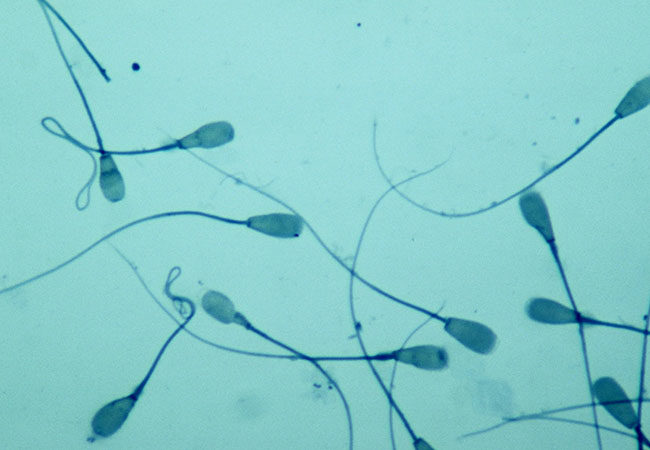New York is known for a lot of things, but we’re willing to bet that the creation of male birth control wasn’t the first to come to mind. It was the 1950’s, and some biochemists were studying parasitic worms, a destructive organism that is the bane of humans, pets, and livestock globally, even to this day. This led the chemists to begin testing an anti-worm drug in lab mice, whose technical name was WIN-18446.
To the scientists’ dismay, the WIN-18446 drug experiment was a complete failure, but they made a discovery along the way that caused them to pivot the goal of their research.
During the trial, the mice were left to do their mouse-y business in between injections of the drug, and as expected, some of the female mice became pregnant, however, none of the anti-worm mice got knocked up. Further studying them produced no evidence of abnormality, so the focus was shifted to the male mice, and the scientists realized that the ones who impregnated the female mice were not the ones dosed with WIN-18446. To their amazement, the mice injected with the drug had stopped producing sperm altogether.
Again, this was the 1950’s, prior to the introduction of the female birth control pill we all know and love, or despise, today. Beyond condoms or sterilization procedures, humans didn’t have birth control available then. But suddenly WIN-18446 offered an entirely new dynamic approach—a chemical contraceptive.
Bingo – male birth control. Right? Wrong. Just because the drug halted the sperm production in these rodents didn’t necessarily mean that it would produce the same effectiveness in human beings. The scientists needed to test this, so they connected with some colleagues in Oregon to begin human trials, where they administered the WIN drug to a few dozen prisoners in a state penitentiary close to Salem. Prison drug trials were very common in this era.
The drug was then produced as a pill, and prisoners popped them for months like candy. In the beginning the WIN pill seemed totally benign, and the drug stopped their sperm production in its tracks. In twelve short weeks, every participant’s sperm count had plummeted. Overall, the testing was performed simply, and as it seemed, successfully. On the WIN-18446 pill, these men were shooting blanks – off it, their sperm count resumed as normal. It was a 100% effective, 100% benign, completely reversible male contraceptive. Perfect.
Or was it?
What the scientists didn’t account for in their initial trial with the mice was: mice don’t drink alcohol. One of the human participants taking the WIN drug in the state prison happened to have a contraband connection on the outside, and helped himself to a few nips of booze in his cot after the lights went out for bedtime. What happened next can only be described as a violent, instantaneous hangover. Rather than getting drunk, he became severely ill. Profuse sweat, heart palpitations, a crushing headache, and brutal nausea set in. Suddenly he was vomiting uncontrollably.
As it turns out, the WIN-18446 drug chokes an enzyme in our bodies called ALDH. Humans have several different kinds of ALDH, each with varying architecture. One form of ALDH is active in the testes and helps produce sperm, but another form is active in the liver, and this version of ALDH interacts with alcohol.
All booze no matter the kind contains ethanol, which is precisely the molecule that gets you tipsy, however the liver metabolizes ethanol into another compound called acetaldehyde. Because acetaldehyde is toxic, the ALDH enzyme converts it into something else, something nontoxic, as livers do. It’s a bit circuitous, but ALDH actually prevents acetaldehyde from building up in the body and poisoning us.
Unfortunately, the WIN drug chokes up both versions of the ALDH enzyme: the version that promotes sperm production and the version that allows us to metabolize booze. As a result, if you take the drug and then consume alcohol, toxic acetaldehyde will begin to accumulate in the body, which is why the prisoner felt so nauseated after a few slugs of ol’ grampa’s cough medicine. He was poisoning himself, and would have died had he kept drinking.
The prisoner fessed up to the scientists that he had ingested alcohol, and told them all about his horrible night. Hesitant to believe him, the drug trial participant produced proof of his indiscretion and showed them a half-empty whisky bottle. At first sight of the evidence, a wave of disappointment fell over the scientists. They soard right through the denial and anger stages, plunging right into unfathomable grief.
The WIN contraceptive trial had been a failure after all.
Now, a reasonable person might ask, “Why not just refrain from drinking?” To which any cynic would likely tell you, “If people couldn’t drink, there’d be no need for birth control.” In actuality, male contraceptives are an unusual concept in medicine – in the 1950’s and even today in 2022. But back then, it was men who generally took responsibility for preventative measures, usually condoms, however the debut of the female birth control pill in 1960 changed the world all at once. Since that time, the responsibility for contraceptives has shifted onto women, and many female critics have complained, not unfairly, about this burden.
Some physicians would argue that if the first iteration of the female birth control pill was introduced today, it would never reach government approval. It produced high blood pressure, mood swings, vaginal bleeding, and even strokes. The side effects were harsh, but while the pill has evolved, some of the most fatal side effects haven’t, as there are still reported strokes, blood clots, and even deaths.
So why approve these contraceptives despite all their potential risks? Because the alternative is birth, and birth itself is an inherent health risk. If we’re looking forward to today, the stranglehold the government has on women’s bodies is growing tighter and tighter with abortion bans and limited access to the already undesirable drugs and other forms of birth control. As imperiled as women potentially are when taking a birth control medication, they’re ten times more likely to experience blood clots during a pregnancy. Stuck between a pill and a hard place, drugs seem to be the lesser evil.
In recent devastating news, the Supreme Court is slated to overturn Roe v Wade (1973), a landmark decision which ruled that the Constitution protects a pregnant woman’s liberty to choose to have an abortion without excessive government restriction. Meanwhile, male birth control has been in and out of research for the past 70 years or so with little success until recently. In response to the current judicial climate, male allies are growing impatient, and are taking it upon themselves to exercise their available options while they wait for FDA approval of a non-hormonal contraceptive pill for men.
Men are getting vasectomies, by any means necessary.
To ease the stress of the procedure, some men have enlisted the idea of a “brostectomy.” The term, trademarked by Dr. Turek of the Turek Clinic, describes a growing trend that makes a party out of getting “snipped.” This social-support-seeking behavior involves two or more “bros” pledging to get the surgical procedure together, and since the famous Roe v Wade document draft leak, vasectomies are on the rise. While this is nowhere near a solution for abortion bans, men who have previously considered the procedure are now taking the opportunity to get it sooner rather than later, by any means necessary.
Steve T, a man who went under the knife for this procedure and is now seven months post-op, shares his reasoning for taking the plunge: “I’ve been meaning to get one for a long, long time. I’ve never wanted kids, but after the election of Trump, the worsening of environmental conditions, the capitol riots, etc. I thought it was finally time. I can’t imagine bringing a child into this world as it is today.” He goes on to say, “[Getting a vasectomy] was definitely worth it because I have that undue stress off my shoulders. My partners can have peace of mind that I’m not putting all the burden on them for contraception, and creampies.”
Another man went as far as starting a GoFundMe campaign for his vasectomy, and interestingly enough, it was his mother’s idea. “It started as a bit between myself and adult film star Xander Corvus a few years ago in an episode of my podcast, And Now We Drink, on the normalization of brosectomies. I’d been certain I didn’t want children for the majority of my life, but when the Supreme Court’s decision came down, Xander and I began rehashing the bit and realized it’s something that definitely needs to be done,” says Matt Slayer. “Xander booked his appointment, and I scheduled mine for the same day, 30 minutes after. Insurance wasn’t going to cover all the costs, so my mother suggested the GoFundMe.”
While Matt certainly had some political reasoning behind his decision to commit to the procedure, he also does a bit of self-reflecting in his campaign, “Save the World, Help Matt Slayer Get Snipped.” He writes, “I’ve known for a long time that procreating isn’t for me. I think I would be a horrible father, and I don’t think your daughters, sisters, mothers or wives should be inflicted with a child after what was most likely a mistake for both of us.”
Men considering vasectomies should be cautioned that it is considered a permanent form of contraception, as it’s not always possible to reverse them. So before going under the knife, make sure you’re doing it for personal, not political reasons, and know that there is a high possibility that an effective male birth control pill is finally on the horizon.
For more information on men’s health, the current status of Roe v. Wade, family planning, and much more, visit www.getmegiddy.com. Giddy is the world’s largest free sexual health platform that works to destigmatize a breadth of taboo topics that are relatable to everyone at all stages in life. There are thousands of articles to browse, and the conversations continue through multiple series’ of enlightening video content touching on dating and relationships, mental health, sexuality, and more. Create a free account and join the discussion at Giddy.


